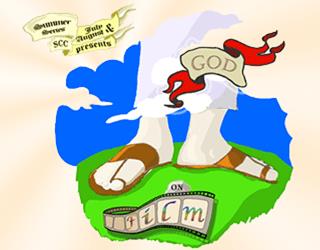
God on Film: Pixels
Who’s the Villain, Who’s the Hero?
Sycamore Creek Church
July 26/27, 2015
Tom Arthur
Peace friends!
It’s a good day to be here as we continue our series God on Film. Each week we’re looking at a different summer blockbuster and exploring a theme or two in that movie. Today’s movie: Pixels. Suspend your sense of disbelief for a moment and enjoy the basic plotline. America sends a rocket into space in the 1980s that includes several cultural artifacts including sample video games. Aliens intercept this rocket and instead of taking it as a sign of friendship, take it as a declaration of war. They mimic the video game characters and come back to earth ready to do some damage, video game style. One of those video game characters that comes back to Earth is Pacman. Of course, Pacman is the good guy in the video game and the ghosts are the bad guys, but in this plot line, Pacman is the bad guy and the only ones who can defeat him are the ghosts.
The Problem
Here’s the problem I want to deal with today: We think we’ll always be who we are right now. If we’re the good guy doing good stuff now, we’ll always be the good guy. If we’re the bad guy now doing bad stuff, then we’ll always be the bad guy doing bad stuff. You think that what you do is who you are and who you will always be. What you are doing is a reflection of who you are, but it is not who you must always be or what you will always do. You see this mistaken thinking in the parable of the turtle and scorpion.
A turtle was swimming up a river when a scorpion on the river’s edge got its attention and asked for a ride on the shell of the turtle. The turtle said, “No way. If I let you climb on my back, you’ll sting me and I’ll die.” The scorpion replied, “Why would I do that? Then we’d both die.” The turtle realized the logic in the scorpion’s response and agreed to let the scorpion climb on its back. Halfway across the river, the turtle felt the sharp sting of the scorpion on its neck. The turtled shouted out, “Why did you do that? Now we’ll both die!” “It’s who I am. I’m a scorpion. I sting,” replied the scorpion as they both began to sink into the water.
Granted, there is some truth in this parable. The most likely predictor of future behavior is past behavior. But this is not always true. I find myself right now having a hard time not raising my voice with my kids. It’s hard not to do so. Sometimes I feel like I will never change. Likewise, I’m a thinker and debater. My tendency is to tell you what I think about what you’ve said before really taking the time to understand it. I’ve been talking to a friend about this and seeking to change. One suggestion was to ask lots of questions before I jump in with my own thoughts. But it’s so hard to remember to ask questions before making statements. Sometimes I feel despair that I will ever be able to change.
These may not be your specific issues but maybe you’re not a good student and you feel like you never will be a good student. Or you have always been overweight and you feel like you’ll never be a healthy weight. Or you’ve never found a romantic partner and you fear you’ll be single your whole life. Or you feel far from God and despair that you will never be or feel close to God.
Today I want to look at a story in the Bible of a guy who no one thought would ever change. But when he encountered Jesus something amazing happened. This guy is called “Saul.” But that was his name before he met Jesus. After he met Jesus he became known as “Paul.” We’ll read the story as it’s told in the ninth chapter of the book of Acts in the Bible.
Meanwhile, Saul was uttering threats with every breath and was eager to kill the Lord’s followers.
~Acts 9:1 NLT
Whoa! This guy Saul was out to KILL anyone who followed Jesus. He was not just out to do it, he was eager to kill them! Saul is essentially a terrorist. I don’t think that’s too strong of a word to describe Saul. He’s essentially like a member of Isis. Now when have you gotten up in the morning and checked the news and seen a story about an Isis fighter and thought, “Man, this guy seems like a guy that God could really use in some big ways.” Never.
Saul reminds me of a guy named Ken in High School. Ken was a terror to all of us who were seeking to follow Jesus. He terrorized us. He would shout us down in the hall. He would corner you and debate you in front of everyone walking by. And he was good at debate. He was on the debate team! I’m not sure how many of these stories that got told about Ken were true, but that’s how we felt as Christians. We never went to school thinking, “Wow, Ken is really somebody that God could use.” While Ken never threatened violence, Ken was like Saul for those of us who encountered him in the hallways of Ben Davis High School.
So he went to the high priest. He requested letters addressed to the synagogues in Damascus, asking for their cooperation in the arrest of any followers of the Way he found there. He wanted to bring them—both men and women—back to Jerusalem in chains.
~Acts 9:1-2 NLT
Notice that it wasn’t just Saul here. It was the whole religious system. The High Priest of the temple was involved. Not just one of the underling priests, but the top dog priest. Sometimes it’s not just a person that seems like they’ll never change, but it’s a whole system. And sometimes that system is the religious system. Will the church ever change?
I think it’s interesting to hear how Christians were referred to at this point in the history of the church. They’re not actually called Christians. They’re called “followers of the Way.” What way? Jesus’ way. They aren’t so much an institution at this point or a religious group, but followers of a particular way or set of practices or way of looking at the world that Jesus taught and lived. It’s important for us Christians to remember that first and foremost we’re not an unchangeable inflexible institution but a community of people following a way that Jesus showed us to see and live. But Saul was following a different way…
As he was approaching Damascus on this mission,
~Acts 9:3 NLT
Saul is a man on a mission. He’s executing a military style strike on Christians. But something happens that he doesn’t have a contingency plan for.
A light from heaven suddenly shone down around him. He fell to the ground and heard a voice saying to him, “Saul! Saul! Why are you persecuting me?”
“Who are you, lord?” Saul asked.
And the voice replied, “I am Jesus, the one you are persecuting! Now get up and go into the city, and you will be told what you must do.”
~Acts 9:3-6 NLT
Saul encounters Jesus, and Jesus sees something different in Saul. Something that those who are being persecuted could never see in Saul. Jesus saw Paul, the first missionary of the church and the future writer of many of the books in the Bible. But right now Saul’s group was without words.
The men with Saul stood speechless, for they heard the sound of someone’s voice but saw no one!
~Acts 9:7 NLT
Saul, the prolific writer of so many books of the Bible is speechless. He is likely quite afraid. And we know that “the fear of the Lord is the beginning of wisdom” (Proverbs 9:10). Paul’s encounter with Jesus leaves him with a wound.
Saul picked himself up off the ground, but when he opened his eyes he was blind. So his companions led him by the hand to Damascus. He remained there blind for three days and did not eat or drink.
~Acts 9:8-9 NLT
Saul’s encounter with Jesus creates not just a physical wound but an existential would. Saul is in crisis. He can no longer see. He can’t see who he is. He can’t see the world around him. He can’t see what he should do. He is blind.
Now there was a believer in Damascus named Ananias. The Lord spoke to him in a vision, calling, “Ananias!”
“Yes, Lord!” he replied.
~Acts 9:10 NLT
God works directly with Saul but he also works indirectly through people to bring about transformation. In this case God is about to work through a man named Ananias. Imagine Ananias’ reaction: “God, you want me to go to WHO?!” This must seem absolutely crazy to Ananias, but he responds saying, “Yes, Lord!”
The Lord said, “Go over to Straight Street, to the house of Judas.
~Acts 9:11 NLT
So God tells Ananias to go to the “house of Judas.” This isn’t the same Judas that betrayed Jesus, but it does remind us of that Judas. While Judas began on the path of following Jesus, he ended on the path of betrayal. But while Saul began on the path of betrayal, he ended on the path of following Jesus as Paul. His life is transformed. This brings us to the point of this entire message: it doesn’t matter where you began, it’s how you end that matters. Judas began strong but ended in betrayal. Saul began with betrayal but ended strong as a changed man with a new name: Paul. It’s not where you begin that matters. What really matters is where you end.
When you get there, ask for a man from Tarsus named Saul. He is praying to me right now. I have shown him a vision of a man named Ananias coming in and laying hands on him so he can see again.”
~Acts 9:12 NLT
The laying on of hands is a symbol in the Bible of reminding you who you really are. Saul is reminded that he is not the persecutor that he thinks he is. He’s something more. Something deeper. But he must be transformed into that something more. There is at this point a physical and spiritual healing in Saul’s life.
Transformation and laying on of hands also happens in baptism. There is the story told of a machinist at Ford who begins to follow Jesus and is baptized. He realizes that he has stolen a lot of tools from his job, and this behavior is inconsistent with following Jesus. So he decides that he must bring the tools back to his boss and confess what he’s done. He explains that he’s been baptized and his life has been transformed. The foreman is so impressed with the behavior of his employee that he sends a telegram immediately to Henry Ford who is visiting a plant overseas. Ford responds, “Dam up the Detroit River and have them all baptized.”
The point here is that an encounter with Jesus and following Jesus changes and transforms your life because it changes who you are.
Another well known leader in the business world is Max DePree. Max DePree’s dad was the founder of Herman Miller and Max was the CEO during the 70s and the 80s. His leadership website points out that under his guidance, Herman Miller “became one of the most profitable Fortune 500 companies. From 1975 – 1986 it ranked seventh in terms of total return to investors.” The site continues by adding that “He is readily forthcoming about his commitment to Christianity, and it is his theology, more than anything else, that shaped who he is and the way he lives.” DePree was well known for running his business with employee participation and involvement in decisions. He advocated the “silver parachute” (in contrast to the CEO “golden parachute”) in which terminated employees were given a severance to help transition. DePree says in his book on leadership, “In the end, it is important to remember that we cannot become what we need to be, by remaining what we are” (Leadership Is an Art).
When we encounter Jesus and who we are is transformed, what we do is transformed too. Saul is able to see again. Who he is changes what he does. He sees the world anew. He has a new vision, imagination, and mission.
Three Pixels of Transformation
Pixel – noun pix·el \?pik-s?l, –?sel\
Any of the small discrete elements that together constitute an image.
So what does this mean for you? A pixel is a small element of a bigger image and today I’ve got three pixels of transformation for you. First, transformation is both a personal and corporate encounter with Jesus. Paul has a very personal encounter with Jesus on the road to Damascus. We may not all have a “Damascus Road” experience with Jesus exactly like Paul’s, but we all need some kind of personal encounter with Jesus. Just believing in an “idea” won’t keep us through the storms of life. We give not only our mind/intellect but also our heart (that deepest part of our selves). Sometimes this is emotional, but often times it’s not. And yet Jesus has an invitation for all of us:
“Look! I stand at the door and knock. If you hear my voice and open the door, I will come in, and we will share a meal together as friends.
~Revelation 3:20 NLT
Jesus personally invites us to a friendship with him. But that encounter is also corporate. Saul has to go to Ananias first. You need someone who believes in you as much as Jesus does. You need someone who guides you when you feel blind. You need someone who lays hands on you and reminds you who you REALLY ARE. These may not all be the same person. They are more likely multiple people in a community of faith. We all need a personal and corporate encounter with Jesus.
Second, we each need to be patient with the transformation process. You don’t start training for a marathon by running 26 miles. When you start training, you can’t run a marathon. No real skill ever happens overnight. It takes time. Be patient.
Third, don’t give up the ghost. In the movie Pixels, pacman is the bad guy and the ghosts, the original bad guys in the video game, are the good guys in the movie! Don’t give up on the ghosts in your life. Don’t give up on the “bad guy” who you think will never be transformed. God can work in anyone’s life and bring transformation. Remember, it’s not where you start that matters, it’s where you end. You may think that radical transformations like Saul to Paul just don’t happen anymore, but you would be wrong. They do. Maybe one of the most dramatic in recent times is the story of Johnny Lee Clary. Clary was a professional wrestler who eventually became the Imperial Wizard of the KKK. After leading the KKK he ended up encountering Jesus and leaving the KKK. He became a preacher in the black denomination, Church of God in Christ (COGIC). Here’s his story:
Jesus stands at the door of each of our lives inviting us to follow him. He doesn’t care where you started. What he is concerned with is where you end:
Look! I stand at the door and knock. If you hear my voice and open the door, I will come in, and we will share a meal together as friends.
~Revelation 3:20 NLT



Recent Comments